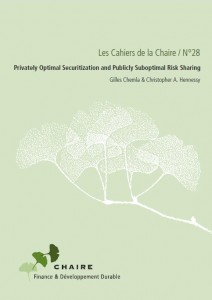 By Gilles Chemla & Christopher A. Hennessy (Cahier de la Chaire n°28)
By Gilles Chemla & Christopher A. Hennessy (Cahier de la Chaire n°28)
Privately informed owners securitizing assets signal positive information by retaining sufficient interest. Signaling provides social bene fits, allowing uninformed investors to insure without fearing adverse selection. Instead of signaling, owners of high value assets may prefer a pooling equilibrium in which they securitize more of the asset, relying on speculators to gather information and bring prices closer to fundamentals. This induces suboptimal risk sharing, since uninformed investors face adverse selection. We analyze privately optimal securitization and the choice between signaling and reliance on speculative markets. In the model, prices are set competitively, with an endogenously informed speculator trading against uninformed hedgers placing rational orders. If a structuring exists providing sufficient speculator gains, her effort is high, mispricing is low, and all/most of the asset is securitized in a pooling equilibrium. Here risky debt and levered equity are optimal, with optimal face value trading off higher unit profi ts for the speculator against lower hedging demand. Hedgers imperfectly insure, buying only the concave claim, the only source of speculator pro ts. If risk-aversion is low and/or endowment shocks are small, hedging demand is low, leading to low speculator effort. Here high types sell only safe debt in a separating equilibrium with perfect risk sharing. The owners incentive to choose the separating equilibrium is weak when risk-aversion is high and/or endowment shocks are large, precisely when efficient risk sharing has high social value.
Keywords: securitization, debt, equity, speculator, hedging demand, separating equilibrium, pooling equilibrium
